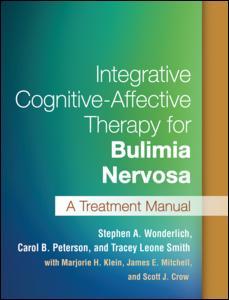Description
Integrative Cognitive-Affective Therapy for Bulimia Nervosa
A Treatment Manual
Authors: Wonderlich Stephen A., Peterson Carol B., Smith Tracey Leone
Language: English
Subject for Integrative Cognitive-Affective Therapy for Bulimia Nervosa:
43.91 €
In Print (Delivery period: 15 days).
Add to cart· 20.3x26.7 cm · Paperback
Description
/li>Contents
/li>Readership
/li>Biography
/li>
Packed with useful clinical tools, this state-of-the-art manual presents an empirically supported treatment solidly grounded in current scientific knowledge. Integrative cognitive-affective therapy for bulimia nervosa (ICAT-BN) has a unique emphasis on emotion. Interventions focus on helping clients understand the links between emotional states and BN as they work to improve their eating behaviors, defuse the triggers of bulimic episodes, and build crucial emotion regulation skills. In a large-size format for easy photocopying, the book includes 47 reproducible handouts. Purchasers get access to a Web page where they can download and print the reproducible materials.
Introduction
I. Conceptual and Clinical Foundations of ICAT-BN
1. An Overview of Bulimia Nervosa: Diagnosis, Complications, and Treatment
2. How Bulimia Nervosa Is Conceptualized in ICAT-BN
3. Emotion Focus, Structure, Goals, and Strategies in ICAT-BN
4. Core Skills and the Therapeutic Alliance in ICAT-BN
II. Four Phases of Treatment Using ICAT-BN
5. Beginning, Engagement, and Education (Phase I)
6. Making Plans for Eating and Managing Urges (Phase II)
7. Modifying Responses to Situational and Emotional Cues (Phase III)
8. Stabilizing Treatment Gains and Termination (Phase IV)
III. ICAT-BN Patient Handouts and Skill Cards
Stephen A. Wonderlich, PhD, is the Chester Fritz Distinguished University Professor in the Department of Clinical Neuroscience at the University of North Dakota School of Medicine and Health Sciences and Director of Clinical Research at the Neuropsychiatric Research Institute. He is also Chairperson of the Eating Disorder Department at Sanford Health in Fargo, North Dakota. Past president of the Academy for Eating Disorders, he is a recipient of the Leadership Award in Research from the Academy for Eating Disorders and the Price Family Award for Research Excellence from the National Eating Disorders Association. Dr. Wonderlich's research interests include the development of new treatments for individuals with eating disorders and the identification of factors that either maintain or increase the risk for eating disorders. Widely published, he serves on several journal editorial boards and has written or edited seven books.
Carol B. Peterson, PhD, is Associate Professor in the Department of Psychiatry and Adjunct Assistant Professor in the Department of Psychology at the University of Minnesota. She is a Fellow of the Academy for Eating Disorders and a member of the editorial board of the International Journal of Eating Disorders. Dr. Peterson's research focuses on the assessment, diagnosis, and treatment of eating disorders, particularly psychotherapy treatment outcome studies. She also maintains a clinical practice and serves as Training Director at the Emily Program, an eating disorders treatment center.
Tracey Leone Smith, PhD, is Associate Professor in the Menninger Department of Psychiatry and Behavioral Sciences at Baylor College of Medicine in Houston. She serves as Psychotherapy Coordinator in Mental Health Services at the Department of Veterans Affairs Central Office. Dr. Smith's research has broadly focused on psychotherapy research, personality disorders, and the interpersonal processes that contribute to the etiology and treatm




